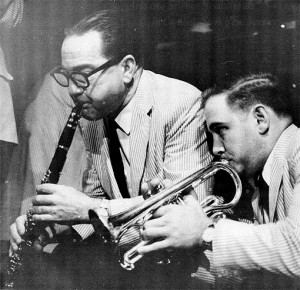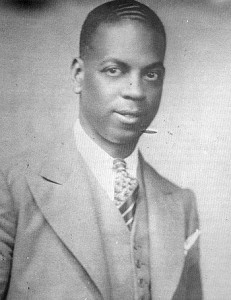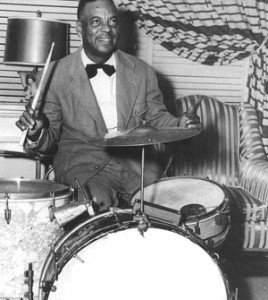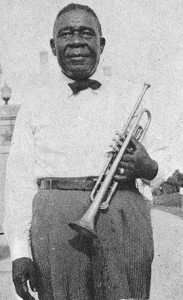In the early 1960s cornetist Jim Cullum was a young man in his 20s. He made a pilgrimage to New Orleans to explore the roots of jazz, meet jazz greats and sit in on jam sessions.
This week on our show Jim Cullum recalls a jam session with cornetist Johnny Wiggs, and Mardi Gras parades when he played with drummer Paul Barbarin and his father Jim Sr. in clarinetist Pete Fountain's Half Fast Marching Band.
A TRIO OF JAZZ PIONEERS
Johnny Wiggs
During the day John Wigginton Hyman worked incognito teaching high school drafting classes. But nights belonged to his life as a jazzman playing cornet around New Orleans under his stage name, Johnny Wiggs.
Around 1917 Johnny Wiggs heard King Oliver play at Tulane University dances, and it changed his life. Wiggs was excited by the power and drive of Oliver’s playing and the subtlety of his muted cornet. He talked about that experience for the rest of his life. Much later on Wiggs would come under the spell of Bix Beiderbecke and his lyrical style of cornet playing.

Johnny Wiggs and His New Orleans Music performing at St. Charles Cocktail Lounge. Photo courtesy Louisiana State Jazz Museum.
For five decades Johnny Wiggs enjoyed a career in music rooted in New Orleans jazz. Wiggs made a key contribution to the fledgling classic jazz revival when he helped launch the New Orleans Jazz Club in 1948. Listeners from the Gulf Coast to Canada heard their live radio broadcasts over station WWL— with traditional jazz legends like 'Papa' Celestin and Paul Barbarin. Fans flocked to their Sunday afternoon jam sessions at the Parisian Room on Royal Street.
Drummer Paul Barbarin
The Barbarin family was "high society" in New Orleans’ brass band dynasty by the time Paul Barbarin was born in the early 1900s. As a young boy in the family kitchen he played the forks and whistled and sang, while his mother and sisters danced to the beat. He graduated to using the spokes of a broken chair he’d whittled into points as drumsticks. Then he took his music to the street corner where he played with other kids until police on horseback would come along and chase them away.
The next step for Paul, at the age of fourteen, was a professional gig drumming with Buddy Petit’s band.
A couple of years later he left for Chicago, where he worked in the stockyards during the day and drummed at night. Before long he was on the bandstand at one of the most popular dance halls on the Southside, backing leaders like King Oliver and Jimmie Noone at the Royal Garden Cafe.
In spite of great success in Chicago and New York, Paul Barbarin returned again and again to his hometown, and by the mid-1950s New Orleans was his base for good. There Barbarin led a popular traditional jazz band, made outstanding recordings and revived his father’s Onward Brass Band. Barbarin composed a number of marching band favorites that live on, including "Bourbon Street Parade" and "The Second Line."
Oscar 'Papa' Celestin
Oscar 'Papa' Celestin called the sugar cane plantations of Assumption Parish, Louisiana, home. His father worked as a cane cutter, one of the most backbreaking jobs a man could have, when young Oscar was born in the 1880s. The first time he heard a brass band play, he was a teenager visiting a country fair. On the spot he decided he’d make his living playing trumpet—though it seemed impossible he’d ever be able to lay his hands on one.
Celestin came to New Orleans when he was 22—a country boy in the big city—and did whatever he had to do to play music. In 1910, appearing at the Tuxedo Dance Hall in his first gig as a bandleader, Celestin decided it might be a profitable gimmick to use tuxedos as band uniforms, which proved successful. He entertained several generations of New Orleans’ elite families—both black and white. Soon just about every band discarded the military-style jackets that had been standard attire for musicians.
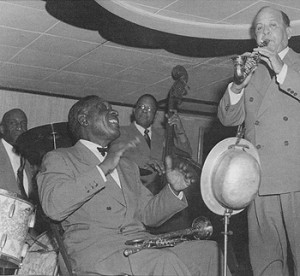
Left to Right: Happy Goldston, 'Papa' Celestin, Richard Alexis, Alphonse Picou. Photo courtesy American Music Recording Oscar ‘Papa’ Celestin with Adophe Alexander, © 2008.
Throughout his 50-year career 'Papa' Celestin was one of New Orleans' best-loved bandleaders and he gave jobs to many of New Orleans' top musicians. The story goes that young Louis Armstrong was playing in Celestin’s Tuxedo Brass Band the day he received that fateful wire from King Oliver inviting him up to Chicago and stardom.
This week on Riverwalk Jazz The Jim Cullum Jazz Band offers a concert of New Orleans traditional jazz classics including "Tin Roof Blues," "Come Back Sweet Papa" and "Flee as a Bird/Over in the Gloryland."
Photo credit for Home Page: Cornetist Johnny Wiggs, 1948 at New Orleans Jazz Club. Photo courtesy Louisiana State Jazz Museum.
Text based on Riverwalk Jazz script by Margaret Moos Pick ©2010


